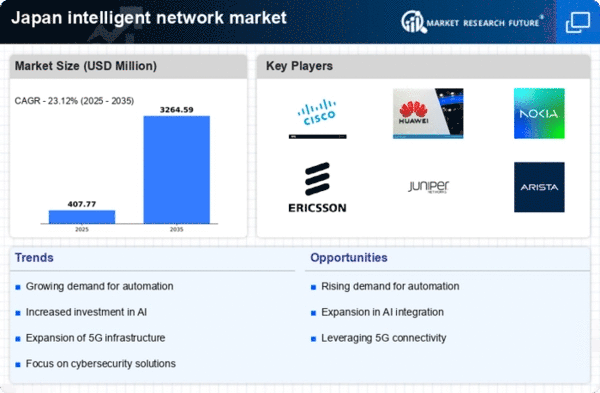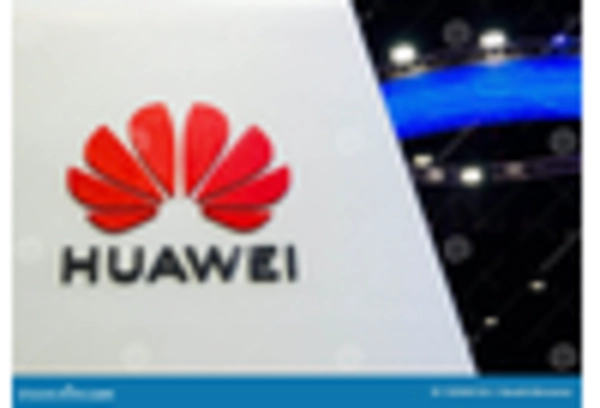Emergence of 5G Technology
The rollout of 5G technology is poised to have a transformative impact on the intelligent network market in Japan. With its promise of ultra-fast connectivity and low latency, 5G is expected to enable a new era of network capabilities. This technological advancement is likely to drive the adoption of intelligent networks, as businesses seek to harness the benefits of enhanced bandwidth and improved performance. Industry reports suggest that the 5G segment within the intelligent network market could witness a growth rate of around 30% over the next few years. As organizations invest in 5G infrastructure, the demand for intelligent network solutions that can effectively manage and optimize these advanced networks will likely increase, further propelling market growth.
Rising Demand for Automation
The intelligent network market in Japan experiences a notable surge in demand for automation solutions. As businesses strive for operational efficiency, the integration of automated systems into network management becomes increasingly vital. This trend is driven by the need to reduce human error and enhance service delivery. According to recent data, the automation segment within the intelligent network market is projected to grow at a CAGR of approximately 15% over the next five years. This growth is indicative of a broader shift towards intelligent systems that can self-manage and optimize network performance. Companies are investing heavily in automation technologies, which are expected to streamline processes and reduce operational costs. Consequently, the intelligent network market is likely to witness a transformation as organizations adopt these advanced solutions to remain competitive in a rapidly evolving digital landscape.
Growing Cybersecurity Concerns
Cybersecurity remains a pressing issue for the intelligent network market in Japan. As cyber threats become more sophisticated, organizations are compelled to adopt robust security measures to protect their networks. The increasing frequency of data breaches and cyberattacks has heightened awareness regarding the importance of cybersecurity solutions. Recent surveys indicate that approximately 70% of businesses in Japan consider cybersecurity a top priority when investing in intelligent network technologies. This heightened focus on security is likely to drive the demand for intelligent network solutions that incorporate advanced security features. Consequently, the intelligent network market is expected to expand as companies seek to fortify their defenses against evolving cyber threats.
Increased Focus on Data Analytics
Data analytics plays a crucial role in shaping the intelligent network market in Japan. Organizations are increasingly leveraging data-driven insights to enhance network performance and user experience. The ability to analyze vast amounts of data allows companies to make informed decisions regarding network optimization and resource allocation. Recent statistics indicate that the data analytics segment within the intelligent network market is anticipated to grow by 20% in the coming years. This growth is fueled by the rising need for real-time monitoring and predictive analytics, which can significantly improve network reliability. As businesses continue to prioritize data analytics, the intelligent network market is expected to evolve, offering more sophisticated tools and solutions that cater to the demands of modern enterprises.
Government Support for Technological Innovation
The Japanese government actively promotes technological innovation, which significantly influences the intelligent network market. Various initiatives and funding programs are designed to encourage research and development in advanced networking technologies. This governmental support is crucial for fostering an environment conducive to innovation and growth. Recent data indicates that public investment in technology-related projects has increased by 25% over the past year, reflecting the government's commitment to enhancing digital infrastructure. As a result, the intelligent network market is likely to benefit from this supportive framework, leading to the development of cutting-edge solutions that address the needs of modern enterprises. The collaboration between public and private sectors is expected to further accelerate advancements in the intelligent network market.
















